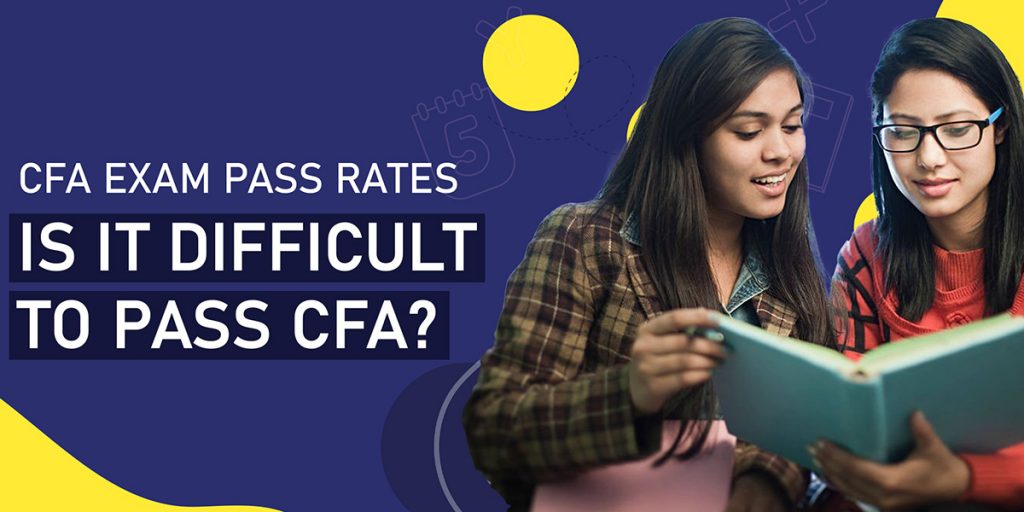CFA Exam Pass Rates: Is it Difficult to Pass CFA?
One of the most prominent and demanding finance programmes that many students choose to enter the financial markets and investments area is the Chartered Financial Analyst programme. This demanding three-year finance programme educates students in all aspects of risk management, investment management, financial planning, and analysis. It takes commitment and set study times to learn all these difficult financial topics. The CFA degree was formerly only open to third-year undergraduate students, but now even second-year students are eligible to apply. As a result, there will be an increase in CFA applications in 2023. Although the flexibility of the eligibility requirements has received much praise, CFA is still one of the hardest to clear.
Machines and charter holders grade the CFA test each year. After that, CFA Institute uses a process to establish a minimum score required to pass each level of the test. This result is kept private. For each test window, the passing percentages for CFA Level I, Level II, and Level III are reported.
The CFA test has three levels and is difficult, which contributes to its low success rate. When you consider that less than half of people pass Level 1, the percentage of persons who complete all levels is low. Let’s examine the facts and talk about how you can improve your chances of passing.
Following is the most recent CFA test passing percentages for all levels:
CFA Level I Exam Pass Rates
| CFA Level I Exam | CFA Level I Exam Pass Rate |
| December 2020 Level I Exam | 49% pass rate |
| February 2021 Level I Exam | 42% pass rate |
| May 2021 Level I Exam | 25% pass rate |
| July 2021 Level I Exam | 22% pass rate |
| August 2021 Level I Exam | 26% pass rate |
| November 2021 Level I Exam | 27% pass rate |
| February 2022 Level I Exam | 36% pass rate |
| May 2022 Level I Exam | 38% pass rate |
| August 2022 Level I Exam | 37% pass rate |
The most recent Level I pass rate is still below the 41% average for all Level I exams. The lowest pass rate in history, 22% in July 2021, marked the start of a trend that has only marginally improved since. The level of anxiety among CFA members is unmistakably high, and understandably so—candidates expended a lot of effort and resources for what turned out to be a disastrous outcome.
We won’t speculatively discuss that subject here because the CFA Institute hasn’t supplied much information on why the Level I pass rate is so far lower than that of prior exam administrations. Instead, we aim to concentrate on offering direction and assistance to all of our CFA applicants, whether successful or failed.
CFA Level II Exam Pass Rates
| CFA Level II Exam | CFA Level II Exam Pass Rate |
| December 2020 Level II Exam | 55% pass rate |
| February 2021 Level II Exam | 46% pass rate |
| May 2021 Level II Exam | 40% pass rate |
| August 2021 Level II Exam | 29% pass rate |
| November 2021 Level II Exam | 46% pass rate |
| February 2022 Level II Exam | 44% pass rate |
| August 2022 Level II Exam | 40% pass rate |
The overall average pass rate for Level II is 46%. The most recent success rate for August 2022, despite varying recent outcomes, continues to highlight the Level II exam’s difficulty.
CFA Level III Exam Pass Rates
| CFA Level III Exam | CFA Level III Exam Pass Rate |
| December 2020 Level III Exam | 56% pass rate |
| February 2021 Level III Exam | 57% pass rate |
| May 2021 Level III Exam | 42% pass rate |
| August 2021 Level III Exam | 39% pass rate |
| November 2021 Level III Exam | 43% pass rate |
| May 2022 Level III Exam | 49% pass rate |
| August 2022 Level III Exam | 48% pass rate |
The success percentage for the Level III test in August 2022 was 48%, continuing the downward trend in pass rates that began in 2021. Recent results are higher than the average Level III pass rate for 2021, which is encouraging for Level III pass rates in the future.
It is unknown why success rates have been so low for recent tests, similar to the Level I and Level II outcomes, but our objective—to assist you in becoming a CFA charter holder—remains the same.
And kudos to those that succeeded. For those who didn’t, we’ll help you go forward in the best way possible and are committed to assisting you in achieving your career objectives.
Why are the Pass Rates So low?

You undoubtedly saw that 2022 scores were starting to approach historical averages. There was a lot of conjecture concerning the causes of the poor scoring in early 2021 and late 2020. As anticipated, scores are starting to stabilize, but applicants should continue to be reminded to study diligently. This is a good moment for you to think about a CFA test study package if these scores worry you and you haven’t yet taken the exam. This will improve your chances of passing the exam.
CFA : Which CFA level is the hardest?

The CFA test has no easy levels. Each level becomes tougher and harder. In the end, only a small portion of applicants who sign up for Level I and persist through it pass all three levels. However, the constructed answer problems on Level III, which take the form of essay questions, are generally agreed to be the most challenging of the three levels of the CFA test.
It might be challenging for folks who are used to the multiple-choice format to write responses. Additionally, some applicants have the propensity to believe that constructed answer questions should be handled similarly to essay questions on a college or graduate school test, despite the fact that they are very different.
Tips for CFA Preparation:

For each level, you should be prepared to devote at least 300 hours to studying. You can boost your chances of passing by developing the knowledge and self-assurance described in the following advice:
- Plan your CFA study schedule and go to work.
- Pay close attention to the Learning Outcome Statements (LOS) provided by the CFA Institute since they specify precisely what you should perform on exam day.
- Enroll in a CFA test prep course.
- Establish a consistent, regular study schedule.
- To let concepts (and their application) percolate, divide your study time between reading and practicing with breaks.
The Bottom Line
The CFA examinations are quite challenging in general, but applicants can improve their chances of passing by devoting more than 300 hours to studying, using alternate prep resources, completing as many practice questions as they can, and developing a well-organized study schedule.
Completing the CFA Program may be highly satisfying, and organizations in the financial sector value the distinction. Through the information they acquire and their access to a vast and outstanding network of CFA specialists, charter holders can grow in their investing professions.




